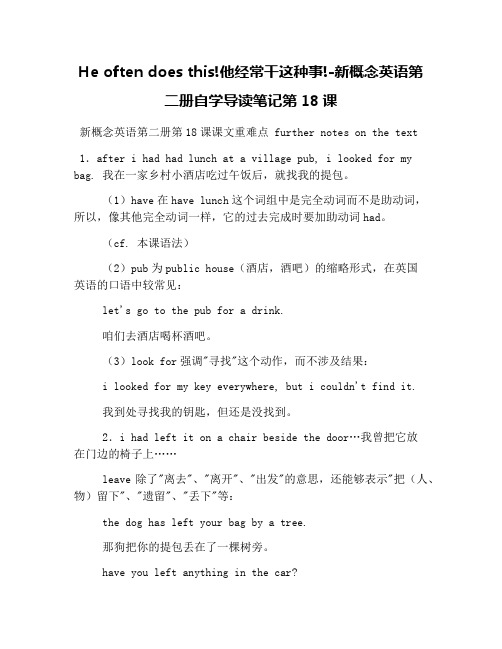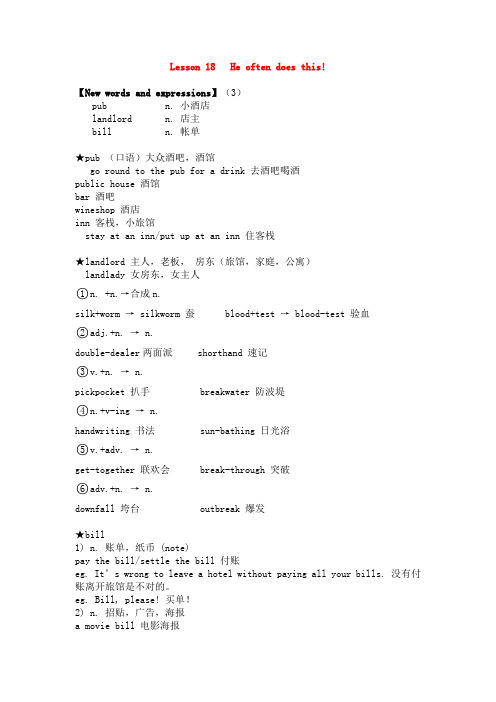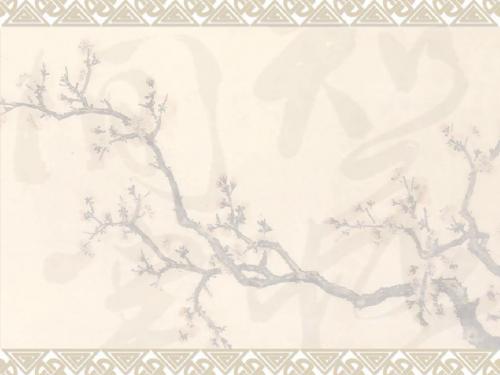新概念英语第二册课堂笔记Lesson18
- 格式:doc
- 大小:29.00 KB
- 文档页数:2

He often does this!他经常干这种事!-新概念英语第二册自学导读笔记第18课新概念英语第二册第18课课文重难点 further notes on the text1.after i had had lunch at a village pub, i looked for my bag. 我在一家乡村小酒店吃过午饭后,就找我的提包。
(1)have在have lunch这个词组中是完全动词而不是助动词,所以,像其他完全动词一样,它的过去完成时要加助动词had。
(cf. 本课语法)(2)pub为public house(酒店,酒吧)的缩略形式,在英国英语的口语中较常见:let's go to the pub for a drink.咱们去酒店喝杯酒吧。
(3)look for强调"寻找"这个动作,而不涉及结果:i looked for my key everywhere, but i couldn't find it.我到处寻找我的钥匙,但还是没找到。
2.i had left it on a chair beside the door…我曾把它放在门边的椅子上……leave除了"离去"、"离开"、"出发"的意思,还能够表示"把(人、物)留下"、"遗留"、"丢下"等:the dog has left your bag by a tree.那狗把你的提包丢在了一棵树旁。
have you left anything in the car?你有没有把什么东西丢在车里?leave the books on the desk.把书放在课桌上。
3.my dog had taken it into the garden. he often doesthis!我的狗把它弄到花园里去了,他常干这种事!he在这里指代的是狗。


Lesson 18 He often does this!【New words and expressions】(3)pub n. 小酒店landlord n. 店主bill n. 帐单★pub (口语)大众酒吧,酒馆go round to the pub for a drink 去酒吧喝酒public house 酒馆bar 酒吧wineshop 酒店inn 客栈,小旅馆stay at an inn/put up at an inn 住客栈★landlord 主人,老板,房东(旅馆,家庭,公寓)landlady 女房东,女主人○1n. +n.→合成n.silk+worm → silkworm 蚕 blood+test → blood-test 验血○2adj.+n. → n.double-dealer两面派 shorthand 速记○3v.+n. → n.pickpocket 扒手 breakwater 防波堤○4n.+v-ing → n.handwriting 书法 sun-bathing 日光浴○5v.+adv. → n.get-together 联欢会 break-through 突破○6adv.+n. → n.downfall 垮台 outbreak 爆发★bill1) n. 账单,纸币 (note)pay the bill/settle the bill 付账eg. It’s wrong to leave a hotel without paying all your bills. 没有付账离开旅馆是不对的。
eg. Bill, please! 买单!2) n. 招贴,广告,海报a movie bill 电影海报eg. No bills! 禁止张贴!fit the bill/fill the bill 合乎要求head the bill/top the bill 领衔主演,挂头牌【Text】After I had had lunch at a village pub, I looked for my bag. I had left it on a chair beside the door and now it wasn't there! As I was looking for it, the landlord came in.'Did you have a good meal?" he asked.'Yes, thank you,' I answered, 'but I can't pay the bill. I haven't got my bag.'The landlord smiled and immediately went out. In a few minutes he returned with my bag and gave it back to me.'I'm very sorry,' he said. 'My dog had taken in into the garden. He often does this!'参考译文我在一家乡村小酒店吃过午饭后, 就找我的提包. 我曾把它放在门边的椅子上, 可这会儿不见了!当我正在寻找时, 酒店老板走了进来.“您吃得好吗?”他问.“很好, 谢谢. “我回答, “但我付不了帐, 我的提包没有了. “酒店老板笑了笑, 马上走了出去. 一会儿工夫他拿着我的提包回来了, 把它还给了我.“实在抱歉, “他说, “我的狗把它弄到花园里去了, 他常干这种事!”【课文讲解】1、After I had had lunch at a village pub, I looked for my bag.★Pub是public house(酒店,酒店)的缩写Let’s go to the pub for a drink.★look for 寻找(过程)eg. I am looking for my bag.look for a job 找工作find 找到(结果,不能用进行时态)eg. I found my brooch under the sofa. 我是在沙发下面找到胸针的。

目录Lesson 1 A private conversation 私人谈话 (4)Lesson 2 Breakfast or lunch? 早餐还是午餐 (11)Lesson 3 Please send me a card 请给我寄一张明信片 (16)Lesson 4 An exciting trip 激动人心的旅行 (21)Lesson 5 No wrong numbers 无错号之虞 (25)Lesson 6 Percy Buttons 珀西.巴顿斯 (31)Lesson 7 Too late 为时太晚 (38)Lesson 8 The best and the worst最好的和最差的 (44)Lesson 9 A cold welcome 冷遇 (49)Lesson 10 Not for jazz不适于演奏爵士乐 (55)Lesson 11 One good turn deserves another礼尚往来 (60)Lesson 12 Goodbye and good luck 再见,一路顺风 (64)Lesson 13 The Greenwood Boys 绿林少年 (68)Lesson 14 Do you speak English? 你会讲英语吗? (74)Lesson 15 Good news 佳音 (80)Lesson 16 A polite request 彬彬有礼的要求 (85)Lesson 17 Always young 青春常驻 (90)Lesson 18 He often does this! 他经常干这种事! (96)Lesson 19 Sold out 票已售完 (99)Lesson 20 One man in a boat 独坐孤舟 (104)Lesson 21 Mad or not? 是不是疯了? (110)Lesson 22 A glass envelope 玻璃信封 (115)Lesson 23 A new house 新居 (119)Lesson 24 It could be worse 不幸中之万幸 (122)Lesson 25 Do the English speak English? 英国人讲的是英语吗? (125)Lesson 26 The best art critics 最佳艺术评论家 (130)Lesson 27 A wet night 雨夜 (136)Lesson 28 No parking 禁止停车 (143)Lesson 29 Taxi! 出租汽车! (149)Lesson 30 Football or polo?足球还是水球? (154)Lesson 31 Success story 成功者的故事 (159)Lesson 32 Shopping made easy 购物变得很方便 (165)Lesson 33 Out of the darkness 冲出黑暗 (171)Lesson 34 Quick work 破案“神速” (177)Lesson 35 Stop thief! 捉贼 (180)Lesson 36 Across the Channel 横渡海峡 (186)Lesson 37 The Olympic Games 奥林匹克运动会 (193)Lesson 38 Everything except the weather 唯独没有考虑到天气 (198)Lesson 39 Am I all right? 我是否痊愈? (203)Lesson 40 Food and talk 进餐与交谈 (208)Lesson 41 Do you call that a hat? 你把那个叫帽子吗? (213)Lesson 42 Not very musical 并非很懂音乐 (219)Lesson 43 Over the South Pole 飞越南极 (224)Lesson 44 Through the forest 穿过森林 (229)Lesson 45 A clear conscience 问心无愧 (234)Lesson 46 Expensive and uncomfortable 既昂贵又受罪 (238)Lesson 47 A thirsty ghost 嗜酒的鬼魂 (243)Lesson 48 Did you want to tell me something? 你想对我说什么吗? (247)Lesson 49 The end of a dream 美梦告终 (250)Lesson 50 Taken for a ride 乘车兜风 (256)Lesson 51 Reward for Virtue 对美德的奖赏 (262)Lesson 52 A pretty carpet 漂亮的地毯 (267)Lesson 53 Hot snake 触电的蛇 (272)Lesson 54 sticky fingers 粘糊的手指 (278)Lesson 55 Not a gold mine 并非金矿 (282)Lesson 56 Faster than sound! 比声音还快! (291)Lesson 57 Can I help you, madam? 您要买什么,夫人? (298)Lesson 58 A blessing in disguise? 是因祸得福吗? (305)Lesson 59 In or out? 进来还是出去? (311)Lesson 60 The future 卜算未来 (315)Lesson 61 Trouble with the Hubble 哈勃望远镜的困境 (318)Lesson 62 Affer the fire 大火之后 (323)Lesson 63 She was not amused 她并不觉得好笑 (329)Lesson 64 The Channel Tunnel 海峡隧道 (334)Lesson 65 Jumbo versus the police 小象对警察 (339)Lesson 66 Sweet as honey!像蜜一样甜! (344)Lesson 67 Volcanoes 火山 (349)Lesson 68 Persistent纠缠不休 (357)Lesson 69 But not murder!并非谋杀! (359)Lesson 70 Red for danger危险的红色 (362)Lesson 71 A famous clock 一个著名的大钟 (366)Lesson 72 A car called Bluebird“蓝鸟”汽车 (369)Lesson 73 The record-holder纪录保持者 (371)Lesson 74 Out of the limelight 舞台之外 (376)Lesson 75 SOS呼救信号 (380)Lesson 76 April Fools' Day愚人节 (386)Lesson 77 A successful operation 一例成功的手术 (388)Lesson 78 The last one? 最后一枝吗? (392)Lesson 79 By air 乘飞机 (397)Lesson 80 The Crystal Palace 水晶宫 (400)Lesson 81 Escape 脱逃 (403)Lesson 82 Monster or fish? 是妖还是鱼? (406)Lesson 83 After the elections 大选之后 (409)Lesson 84 On strike 罢工 (412)Lesson 85 Never too old to learn 活到老学到老 (415)Lesson 86 Out of control 失控 (419)Lesson 87 A perfect alibi 极好的不在犯罪现场的证据 (421)Lesson 88 Trapped in a mine困在矿井里 (423)Lesson 89 A slip of the tongue 口误 (426)Lesson 90 What's for supper? 晚餐吃什么? (429)Lesson 91 Three men in a basket 三人同篮 (434)Lesson 92 Asking for trouble 自找麻烦 (437)Lesson 93 A noble gift 崇高的礼物 (439)Lesson 94 Future champions 未来的冠军 (442)Lesson 95 A fantasy 纯属虚构 (445)Lesson 96 The dead return 亡灵返乡 (447)本文档仅用于学习交流之用,不得用于商业目的。


LESSON 18 He often does this! 1.have a pen 有 have a headache 患病 have做“有,患病”概念时,可作为实意动词,也可作为⾮实意动词 如果⼀个词是以完成时态出现的,其中的have只能作为⾮实意动词 除上⾯以外的have只能作为实意动词 下⾯三种情况,have可以被have got取代 I have a pen.=I have got a pen. “有” I have a headache.=I have got a headache. “得病” have to=have got to 2.还是have,更详细⼀些了 (1)动词have有两种⽤法。
⼀是作为助动词构成各种完成时(包括过去、现在、将来)和完成进⾏时: I haven't seen him this morning. 我今天上午没见过他。
When I rang, Tim had already left. 我打电话的时候,蒂姆已经⾛了。
(2)have还可以作完全动词。
当它作“具有”、“拥有”讲时,它和have got通常可以互换。
在英国英语中,疑问句和否定句中 have(具有)的⽤法与be相同,即可以不⽤助动词do(或did)。
I haven't got any pencils. 我没有铅笔。
在美国英语中,常⽤do,did等与have⼀起构成疑问句和否定句: 这种形式在英国英语中现在也常见了。
have作“具有”、“拥有”讲时是状态动词,不能⽤于进⾏时态或被动语态。
它通常⽤于⼀般现在时: You can have these apples if you want them. I've got a lot more. 如果你想要这些苹果你可以把它们拿⾛。
我还有许多。
He has(got) a Ford. 他有⼀辆福特牌汽车。
在其他时态中,⼀般⽤have⽽不⽤ have got: He had a Ford last year. 去年他有过⼀辆福特牌汽车。
NCE2018.txt【New words and expressions】(3)pub n. 小酒店landlord n. 店主bill n. 帐单【课文讲解】1、After I had had lunch at a village pub, I looked for my bag.Pub是public house(酒店,酒店)的缩写2、I had left it on a chair beside the door and now it wasn't there!leave除了“离去,离开,出发”的意思,还可以表示“把(人、物)留下,遗留,丢下”等。
Have you left anything in the car?3、'I'm very sorry,' he said. 'My dog had taken in into the garden. He often does this!'he指店主的狗,英语国家人士常用人称代词he或she指自己喂养的宠物。
【Key structures】have的用法1、have作为助动词构成各种完成时和完成进行时2、have还可以作完全动词,当作“具有、拥有”讲时,它和have got通常可以互换。
have 做“有, 患病”概念时, 可作为实义动词, 也可作为非实义动词。
在英国英语中的疑问句和否定句中have(具有)的用法与be相同,即可以不用助动词do或did;在美国英语中,常用do助动词和have一起构成疑问句和否定句。
I don’t have a pen/a headache.I haven’t a pen /a headache.三种情况have 可以用have got取代have to== have got tohave作“具有,拥有”讲时是状态动词,不能用于进行时态或被动语态,通常用于一般现在时。
单词学习pub (口语)大众酒吧,酒馆go round to the pub for a drink 去酒吧喝酒pub-crawl 在数家酒馆连续喝酒public house 酒馆bar 酒吧wineshop 酒店inn 客栈,小旅馆stay at an inn/put up at an inn 住客栈landlord 主人,老板,房东(旅馆,家庭,公寓)landlady 女房东,女主人n. +n.→合成n.silk+worm → silkworm 蚕blood+test → blood-test 验血adj.+n. → n.double-dealer两面派shorthand 速记v.+n. → n.pickpocket 扒手breakwater 防波堤n.+v-ing → n.handwriting 书法sun-bathing 日光浴v.+adv. → n.get-together 联欢会break-through 突破adv.+n. → n.downfall 垮台outbreak 爆发lordas drunk as a lord 酩酊大醉eg. Lord! 天啊!哎呀!哎哟!lord n. 贵族,勋爵duke [dju:k] 公爵marquis ['mɑ:kwɪs, mɑ:'ki:] 侯爵earl [ɜ:l] 伯爵viscount ['vaɪ,kaʊnt] 子爵baron ['bærən] 男爵sir 爵士ladyeg. Lady first. 女士优先。
Ladies and gentlemen 先生们,女士们(称呼套话)Ladies 女厕所bill1) n. 账单,纸币 (note)pay the bill/settle the bill 付账eg. It’s wrong to leave a hotel without paying all your bills. 没有付账离开旅馆是不对的。
新概念英语第二册:第18课课文详解及语法解析课文详注 Further notes on the text1.After I had had lunch at a village pub, I looked for my bag.我在一家乡村小酒店吃过午饭后,就找我的提包。
(1)have在have lunch这个词组中是完全动词而不是助动词,所以,像其他完全动词一样,它的过去完成时要加助动词had。
(cf. 本课语法)(2)pub为public house(酒店,酒吧)的缩略形式,在英国英语的口语中较常见:Let's go to the pub for a drink.咱们去酒店喝杯酒吧。
(3)look for强调“寻找”这个动作,而不涉及结果:I looked for my key everywhere, but I couldn't find it.我到处寻找我的钥匙,但还是没找到。
2.I had left it on a chair beside the doo r…我曾把它放在门边的椅子上……leave除了“离去”、“离开”、“出发”的意思,还能够表示“把(人、物)留下”、“遗留”、“丢下”等:The dog has left your bag by a tree.那狗把你的提包丢在了一棵树旁。
Have you left anything in the car?你有没有把什么东西丢在车里?Leave the books on the desk.把书放在课桌上。
3.My dog had taken it into the garden. He often doesthis!我的狗把它弄到花园里去了,他常干这种事!he在这里指代的是狗。
动物通常用it来代表,即被看成像东西一样。
但是,指宠物、家畜或民间故事中的动物时,我们经常也用he,she,who等,即使得它们“人格化”并具有性别。
Lesson 18 He often does this!一、Grammar:have用法Have:助动词:构成各种完成时(现在、过去、将来)和完成进行时;have/has done; had done; will/shall done实义动词:1、表示“具有”、“拥有”时为状态动词,与have got可互换,一般不用于进行时或被动语态。
2、表示eat、drink、enjoy、take等意思时,可用于各种时态。
Eg:have lunch;have a cup of coffee;have a good time;have a bath对以上各种完成时举例:现在完成时:He has just gone to Beijing.过去完成时:The film had begun before we got to the cinema.将来完成时:By the time you get home I will have cleaned the house from top to bottom. (注:将来完成时表示将来某一时间以前已经完成的动作,并对将来产生影响。
一般它的时间状语为:before/by+将来时间;by the time引导从句)二、课文语言点:1、look for:表示动作,不涉及结果;find:表示结果2、leave:1)离开:leave for+地点:动身去某地;leave+地点+for+地点:离开某地去某地2)遗弃: Her husband has left her. 她的丈夫把她遗弃了。
3)遗忘,丢下:I left my keys at home.4)留给,遗留:The famous actress left all her money to charity.(慈善机构)5)让某物处于某种状态:He left the window open. 他让窗户开着。
3、beside:只作介词,“在旁边”=next to(旁边,紧挨着)Eg:There is a boy beside near the door. 有个男孩在门的旁边。
新概念英语第二册lesson18 课堂笔记
学员:周若晨教师:李军力
【New words and expressions】(3)
pub n. 小酒店landlord n. 店主bill n. 帐单
【课文讲解】
1、After I had had lunch at a village pub, I looked for my bag. Pub是public house(酒店,酒店)的缩写
2、I had left it on a chair beside the door and now it wasn't there! leave除了“离去,离开,出发”的意思,还可以表示“把(人、物)留下,遗留,丢下”等。
Have you left anything in the car?
3、'I'm very sorry,' he said. 'My dog had taken in into the garden. He often does this!' he指店主的狗,英语国家人士常用人称代词he或she指自己喂养的宠物。
【Key structures】
have的用法
1、have作为助动词构成各种完成时和完成进行时
2、have还可以作完全动词,当作“具有、拥有”讲时,它和have got通常可以互换。
have做“有, 患病”概念时, 可作为实义动词, 也可作为非实义动词。
在英国英语中的疑问句和否定句中have(具有)的用法与be相同,即可以不用助动词do或did;在美国英语中,常用do助动词和have一起构成疑问句和否定句。
I don’t have a pen/a headache.
I haven’t a pen /a headache.
三种情况have 可以用have got取代
have to== have got to
have作“具有,拥有”讲时是状态动词,不能用于进行时态或被动语态,通常用于一般现在时。
在其它时态中,一般用have而不用have got。
You can have these apples if you want them. I’ve got a lot more.
He must be very fond of animals to have five dogs. 他一定非常喜欢动物,才会养五条狗。
3、have作完全动词时,还可以表示eat,drink,enjoy,take等意思,这时它是行为动词,可以用于包括进行时的各种时态。
当have用于表示这些含义时,它必须与助动词do等连用以构成疑问句或否定句。
have dinner,have a cigarette/ coffee/a holiday/a good time/a swim/a rest Exercises C
在下面哪几句话中可用have got来代替have?
1 He had a drink before dinner. ⑴...不换...
2 Mrs. Sullivan has a lot of money. ⑵...换... 有钱
3 He had to leave early. ⑶...换...
4 We have had a long conversation. ⑷...不换...进行
5 My mother has a headache. ⑸...换... 患病
6 They had a good time at the party. ⑹...不换...
have a good/long time : 过的愉快(固定短语)
7 This sock has a hole in it. ⑺...换...
8 She has to be patient with him. ⑻...换... has to
9 I have a bath every day. ⑼...不换...
10 10 This room has four windows. ⑽...换...
11 He has a farm. ⑾...换...
12 We had a letter from Jill yesterday. ⑿...不换...
have a letter from==receive a letter from 收到
【Special Difficulties】
give的几个固定搭配
give常用含义是“给予,交给”
gave away 赠送give in上交呈交,屈服,让步,投降He gave away all his books to the library.
Give in your examination papers after you’ve finished. You can do what you like. I will never give in.
give up doing sth. 放弃,抛弃give up 交出,让出
Jack has given up the watch he stole last week.
Three of our officers gave themselves up to the enemy. 我方的三名军官向敌人投降了。
Beside and Besides
beside pron. 在……旁边,在……附近
Come and sit beside us.
besides adv. 而且,并且,此外;pron. 除……之外(还)I’m quite busy. Besides, I’ve got a bad cold.
There were a lot of people at the party besides us.。